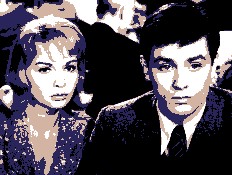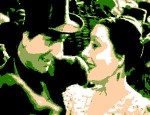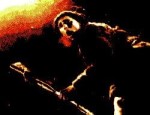Film Review

Like the earlier Aymé adaptation, Le Chemin des écoliers is distinguished by an extraordinary cast that comprises some of the biggest names in French cinema at the time (including some at the start of their meteoric careers). The loveable buffoon Bourvil is back, playing a similar amiable neurotic to the one he had portrayed so sympathetically in La Traversée de Paris, but here he is the father of none other than Alain Delon, just a few years before he became an international superstar.
Lino Ventura, now an established star after his appearances in stylish modern policiers such as Touchez pas au grisbi (1954), is cast in the kind of ambiguous role for which he is particularly well-suited, a cynical restaurateur catering for Nazis and collaborators, and rising star Jean-Claude Brialy makes his presence felt as Delon's bosom pal, the most slippery character in the film. Delon's love interest is played by Françoise Arnoul, the seductive siren who had earlier in the decade made an easy conquest of Fernandel and Jean Gabin. It is rare to encounter a French film of this period in which so many talented stars are brought together and form such an effective ensemble.
Le Chemin des écoliers may be as authentic in its representation of life in Occupied France as La Traversée de Paris, but it a far less engaging film, in spite of its stellar cast. The main reason for this is that it shows far less in the way of directorial flair, being helmed without much enthusiasm by journeyman Michel Boisrond. In the '50s and '60s, Boisrond enjoyed some success as a purveyor of mainstream ephemera, his forte being frivolous comedy diversions exemplified by the ones he made with Brigitte Bardot at the sex kitten dawn of her career - Cette sacrée gamine (1955), Une Parisienne (1957), Voulez-vous danser avec moi? (1959). Unlike Claude Autant-Lara, who takes a malicious relish in evoking the dark condemnatory subtext of Aymé's novel in his own adaptation, Boisrond is content merely to deliver an inoffensive crowdpleaser. Le Chemin des écoliers is by no means a bad film, but it is far duller than it deserves to be, given the calibre of the writers and cast.
© James Travers 2019
The above content is owned by frenchfilms.org and must not be copied.
Film Synopsis
Paris, 1943. With the country still under Nazi occupation and commodities severely rationed, ordinary French people muddle through as best they can. Charles Michaud is a law-abiding man of impeccable morals who becomes duly anxious when he finds that his 17-year-old son Antoine has been regularly absconding from school. Little does he know that his wayward offspring has been busy engaging in black market activities with his friend Paul Tiercelin, so that he can earn enough money to keep his mistress Yvette in the manner to which she has grown accustomed.To uncover what his son is up to, Charles confides his concerns in Paul's father, the owner of a restaurant frequented by German officers that is supplied by black market produce. To deflect Charles's attention from his son's dubious exploits, Monsieur Tiercelin brings him into contact with Olga, a young woman of very easy virtue. Meanwhile, Antoine's career as a black marketeer proves increasingly lucrative and the young man is soon taking delivery of a large consignment of champagne. Despite various attempts to distract him, it is not long before Monsieur Michaud discovers the truth about his son...
© James Travers
The above content is owned by frenchfilms.org and must not be copied.
Similar Films
Here are some other films you may enjoy watching:- Monsieur Batignole (2002)
- La Grande illusion (1937)
- La Vache et le prisonnier (1959)
- Good Morning, Vietnam (1987)
- Boule de suif (1945)
Other related links:
Film Credits
- Director: Michel Boisrond
- Script: Marcel Aymé (novel), Jean Aurenche, Pierre Bost
- Cinematographer: Christian Matras
- Music: Paul Misraki
- Cast: Françoise Arnoul (Yvette Grandmaison), Bourvil (Charles Michaud), Lino Ventura (Tiercelin), Alain Delon (Antoine Michaud), Jean-Claude Brialy (Paul Tiercelin), Pierre Mondy (Lulu), Paulette Dubost (Hélène Michaud), Micheline Luccioni (Solange), Christian Lude (Lollivier), Jean Brochard (M. Coutelier), Gaby Basset (Lucette), Claude Castaing (Dominique), Martine Havet (Pierrette Michaud), Madeleine Lebeau (Flora), Sandra Milo (Olga)
- Country: France / Italy
- Language: French
- Support: Black and White
- Runtime: 90 min
- Aka: Way of Youth
The greatest French Films of all time

The best of Russian cinema

Kafka's tortuous trial of love
